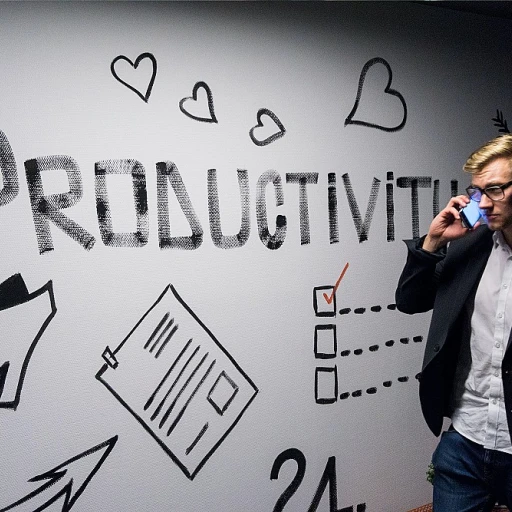
Understanding the impact of technology on HR processes
The Shift Towards Digital Transformation in HR
In today's digital age, technology is reshaping how organizations manage their human resources. The adoption of advanced systems and digital tools is not just about automating processes; it is about driving organizational performance and staying competitive. Companies that embrace technological advancements in HR are seeing measurable improvements in efficiency, employee productivity, and overall business outcomes. According to a recent study by Deloitte, organizations that invest in digital transformation are more likely to achieve organizational success and maintain a competitive advantage in their industries.
How Technology Enhances HR Processes
Modern HR management relies on a range of technology solutions to streamline workflows and improve decision making. From cloud-based HR systems to artificial intelligence-powered platforms, these tools help organizations:
- Automate repetitive tasks, freeing up HR teams for more strategic work
- Centralize employee data for better data driven insights
- Support compliance and risk management
- Enable remote work and flexible training opportunities
By integrating these digital solutions, companies can boost organizational performance and foster a culture of continuous learning and innovation technology. This shift is not only about efficiency but also about enhancing the employee experience and supporting business growth.
Building a Tech-Savvy HR Function
For organizations to fully realize the benefits of technology adoption, HR professionals need to develop digital skills and a mindset focused on innovation. Training and upskilling initiatives are essential for ensuring that HR teams can leverage data analytics, manage new systems, and drive transformation. This approach supports the role organizational leaders play in guiding their teams through change and maximizing the impact of technology enhancing HR processes.
As more companies look to improve organizational performance through digital transformation, understanding the differences between Employer of Record and PEO for AI-driven HR teams becomes increasingly important. Choosing the right model can influence how effectively a business manages its workforce and adapts to technological change.
AI-powered recruitment and talent acquisition
Transforming Talent Acquisition with Artificial Intelligence
Artificial intelligence is reshaping how organizations approach recruitment, making the process more efficient and data driven. By integrating advanced technology into HR systems, companies can streamline their talent acquisition strategies, reduce time-to-hire, and improve organizational performance. The digital transformation of recruitment is not just about automation; it’s about leveraging data analytics and machine learning to make smarter decisions and enhance the overall candidate experience.
- Automated Resume Screening: AI-powered tools can quickly scan thousands of applications, identifying the most relevant candidates based on predefined criteria. This increases efficiency and allows HR teams to focus on higher-value tasks.
- Bias Reduction: By relying on data and algorithms, technology can help minimize unconscious bias in the hiring process, promoting a more diverse and inclusive workforce.
- Predictive Analytics: AI systems analyze historical data to predict which candidates are most likely to succeed in specific roles, supporting better decision making and boosting organizational success.
- Enhanced Candidate Experience: Digital solutions like chatbots and automated scheduling provide real-time communication, making the application process smoother and more engaging for job seekers.
According to a recent study on AI-driven HR transformation, organizations adopting artificial intelligence in recruitment report higher employee productivity and a stronger competitive advantage in the digital age. These technological advancements are not just about filling positions faster—they are about aligning talent strategies with business goals and ensuring long-term organizational success.
As companies continue their digital transformation journeys, the role organizational leaders play in technology adoption becomes critical. Embracing innovation technology in recruitment is a key step to stay competitive and improve organizational outcomes. Investing in training and learning for HR professionals ensures they remain tech savvy and ready to leverage the latest technology solutions for business growth.
Enhancing employee engagement through digital tools
Driving Employee Engagement in the Digital Age
The digital transformation of human resources is reshaping how organizations connect with their employees. Technology adoption is no longer just about automating processes; it is about enhancing the employee experience and fostering a culture of engagement that directly impacts organizational performance. Digital tools, such as employee engagement platforms, internal communication apps, and feedback systems, are now central to business success. These solutions empower employees to share their voices, participate in decision making, and access resources that support their growth. When organizations leverage these technologies, they see measurable improvements in employee productivity and satisfaction. A recent study on technology enhancing employee engagement found that companies using digital platforms for real-time feedback and recognition reported a significant increase in employee motivation and retention. This, in turn, contributes to improved organizational performance and helps businesses stay competitive in a rapidly changing environment.- Efficiency: Digital systems streamline communication and reduce administrative burdens, allowing HR teams to focus on strategic initiatives.
- Personalization: AI-driven tools can tailor training and learning opportunities to individual employee needs, boosting engagement and skill development.
- Data-driven insights: Engagement platforms collect valuable data, enabling organizations to identify trends and address issues proactively.
Leveraging data analytics for better decision-making
Making Smarter Choices with Data-Driven Insights
In the digital age, organizations are increasingly turning to data analytics to improve organizational performance and drive business success. The adoption of technology in human resources has transformed traditional processes, making them more efficient and aligned with organizational goals. By leveraging advanced data systems, HR teams can move beyond intuition and make decisions rooted in real evidence.
Data analytics enables companies to track key metrics related to employee productivity, training outcomes, and overall workforce engagement. This shift towards data-driven decision making supports the broader digital transformation efforts seen across industries. For example, organizations can identify trends in employee turnover, measure the impact of learning initiatives, and optimize talent management strategies for better results.
- Efficiency: Automated data collection and analysis reduce manual work, freeing up HR professionals to focus on strategic tasks.
- Accuracy: Data-driven insights minimize biases and errors, leading to fairer and more effective management decisions.
- Competitive advantage: Companies that embrace data analytics can quickly adapt to market changes and stay competitive in a rapidly evolving landscape.
Technological advancements in artificial intelligence further enhance the role organizational data plays in decision making. AI-powered analytics tools can process vast amounts of information, uncovering patterns that would be difficult for humans to detect. This empowers organizations to predict future workforce needs, personalize employee learning paths, and identify opportunities for innovation technology adoption.
According to a recent study published by the Society for Human Resource Management, organizations that integrate data analytics into their HR processes report higher levels of employee engagement and improved organizational performance. These findings highlight the importance of technology solutions in shaping the future of work and supporting organizational success.
Ultimately, embracing data analytics is not just about technology adoption. It's about creating a culture where informed decision making, continuous improvement, and digital transformation are at the core of business strategy. This approach ensures that companies remain agile, tech savvy, and ready to boost organizational performance in a competitive environment.
Personalizing learning and development with AI
AI-driven personalization: transforming employee learning journeys
Artificial intelligence is reshaping how organizations approach employee training and development. In the digital age, companies are leveraging technology to create personalized learning experiences that adapt to individual needs, skills, and career aspirations. This shift is not just about delivering content online, but about using data and advanced systems to boost organizational performance and employee productivity. AI-powered platforms analyze employee data, such as performance metrics, learning history, and role requirements. This enables HR teams to recommend targeted training modules, suggest relevant upskilling opportunities, and even predict future skill gaps. As a result, employees receive tailored learning paths that align with both their personal growth and the company’s strategic goals.- Efficiency: Personalized learning reduces time spent on irrelevant training, allowing employees to focus on what matters most for their roles.
- Engagement: Custom content increases motivation and participation, leading to higher completion rates and better knowledge retention.
- Data-driven decisions: HR can use analytics to measure the impact of training programs on organizational success and adjust strategies accordingly.
Addressing ethical challenges in AI-driven HR
Building Trust in AI-Driven HR Systems
As organizations accelerate their digital transformation, the adoption of artificial intelligence in HR processes brings both opportunities and challenges. While AI can boost organizational performance by increasing efficiency, improving decision making, and enhancing employee productivity, it also raises important ethical questions. Addressing these concerns is crucial for maintaining trust and ensuring the long-term success of technology-enhanced HR management.
Key Ethical Considerations
- Data Privacy and Security: The use of AI in HR relies heavily on employee data. Protecting this data is essential to avoid breaches and maintain confidentiality. Organizations must implement robust data management systems and comply with regulations to safeguard sensitive information.
- Bias and Fairness: AI-powered recruitment and talent management systems can unintentionally reinforce existing biases if not carefully monitored. Regular audits and transparent algorithms help ensure fair treatment and equal opportunities for all employees, supporting organizational success and a positive company culture.
- Transparency and Explainability: Employees and management need to understand how AI-driven decisions are made. Clear communication about how technology solutions work increases trust and helps employees feel more comfortable with digital processes.
- Accountability: When AI is involved in decision making, it is vital to define who is responsible for outcomes. Organizations should establish clear guidelines for oversight and intervention, especially in cases where automated systems impact employee careers or well-being.
Best Practices for Ethical AI Adoption
To improve organizational performance while maintaining ethical standards, companies should:
- Invest in regular training for HR teams to stay competitive and tech savvy in the digital age.
- Promote a culture of transparency around AI and data analytics, encouraging open dialogue about technological advancements.
- Continuously review and update digital systems to align with evolving legal and ethical standards.
- Engage employees in the transformation process, ensuring their voices are heard and their concerns addressed.
By prioritizing these ethical considerations, organizations can harness the power of artificial intelligence and technology adoption to drive innovation, enhance employee engagement, and achieve sustainable organizational success.













